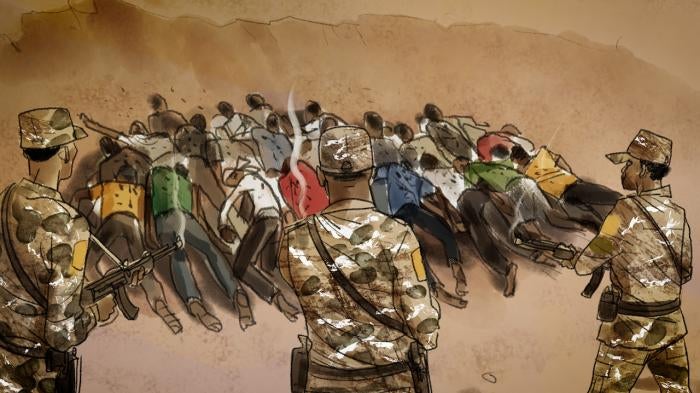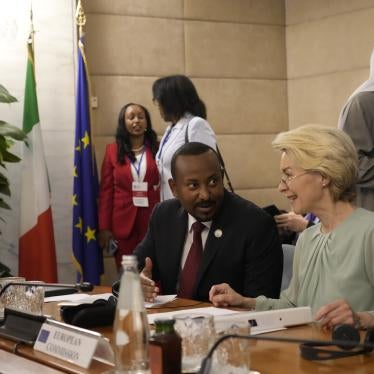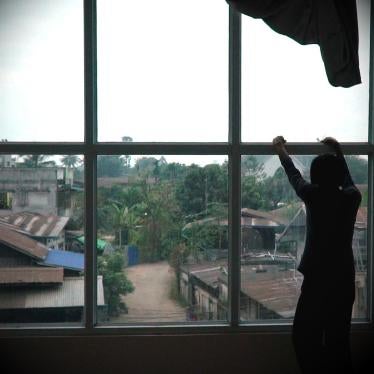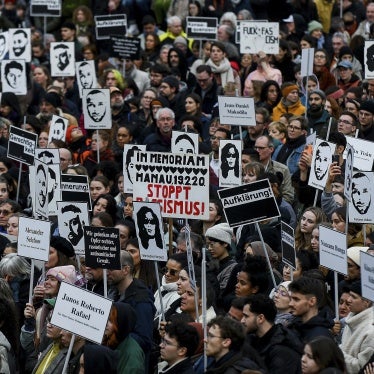(Berlin) – Sicherheitskräfte und Behördenvertreter*innen der äthiopischen Region Amhara haben im Westen der angrenzenden Region Tigray seit November 2020 umfassende Menschenrechtsverletzungen an der tigrayischen Bevölkerung begangen, die Kriegsverbrechen und Verbrechen gegen die Menschlichkeit gleichkommen. Zu diesem Schluss kommen Amnesty International und Human Rights Watch in dem gemeinsamen Bericht ‘We Will Erase You From This Land’: Crimes Against Humanity and Ethnic Cleansing in Ethiopia’s Western Tigray Zone.
Die Recherchen belegen, dass Behördenvertreter*innen in West-Tigray sowie Sicherheitskräfte aus der benachbarten Region Amhara mehrere hunderttausend tigrayische Zivilpersonen systematisch vertrieben haben – unter Einsatz von Drohungen, außergerichtlichen Tötungen, sexualisierter Gewalt, willkürlichen Massenfestnahmen, Plünderungen, Zwangsumsiedlungen und der Verweigerung humanitärer Hilfe. All dies geschah mit Billigung und unter möglicher Beteiligung der nationalen äthiopischen Streitkräfte. Diese umfassenden und systematischen Angriffe gegen die tigrayische Zivilbevölkerung stellen Verbrechen gegen die Menschlichkeit sowie Kriegsverbrechen dar.
Sicherheitskräfte trieben tausende Tigrayer*innen zusammen, um sie unter unwürdigen Bedingungen einzusperren und zu misshandeln. Tausende Frauen und Mädchen wurden vergewaltigt und dabei rassistisch beleidigt. Behördenvertreter*innen stellten Schilder auf, die Tigrayer*innen aufforderten, die Region zu verlassen. Der Zugang zur Region wurde massiv eingeschränkt, sodass kaum humanitäre Hilfe zu den Menschen gelangt und Hunderttausende von einer Hungersnot bedroht sind.
Wenzel Michalski, Deutschland-Direktor von Human Rights Watch, sagt: „Seit November 2020 führen Amhara-Sicherheitskräfte eine unerbittliche Kampagne durch, um Tigrayer*innen aus dem Westen der Region zu vertreiben. Die äthiopische Regierung hat das schockierende Ausmaß dieser Verbrechen beharrlich geleugnet und nichts getan, um sie zu verhindern. Die äthiopische Regierung muss endlich reagieren: Sie muss diejenigen Sicherheitskräfte umgehend entwaffnen und aus der Region abziehen, die an Menschenrechtsverletzungen beteiligt waren.“
Markus N. Beeko, Generalsekretär von Amnesty International in Deutschland, sagt: „Die Reaktionen der internationalen und regionalen Partner Äthiopiens werden der Schwere der Verbrechen, die in West-Tigray verübt werden, nicht gerecht. Es muss alles dafür getan werden, den unmenschlichen Grausamkeiten ein Ende zu setzen. Die äthiopische Zentralregierung und die Regionalregierungen müssen gewährleisten, dass die tigrayische Bevölkerung sicher und auf freiwilliger Basis in ihre Heimat zurückkehren kann, und gemeinsame Anstrengungen unternehmen, um Gerechtigkeit für diese abscheulichen Verbrechen zu erreichen.“
Die Menschenrechtsorganisationen fordern von der äthiopischen Regierung, Hilfsorganisationen umgehend ungehinderten Zugang zu der Region zu gewähren, alle willkürlich Inhaftierten freizulassen und Menschenrechtsverstöße zu untersuchen, um angemessen gegen die Verantwortlichen vorgehen zu können. Die Konfliktparteien sollten der Entsendung einer internationalen Friedenstruppe unter Führung der Afrikanischen Union nach West-Tigray zustimmen, um den Schutz aller Bevölkerungsgruppen vor Übergriffen zu gewährleisten.
Über einen Zeitraum von 15 Monaten führten Amnesty International und Human Rights Watch Interviews mit mehr als 400 Personen. Die Researcher*innen zogen auch medizinische und forensische Berichte sowie Gerichtsdokumente zu Rate und verifizierten Satellitenbilder und Foto- und Videobeweise. Sowohl die äthiopischen Streitkräfte als auch die amharischen Behörden haben ethnische Säuberungen in West-Tigray von sich gewiesen.








